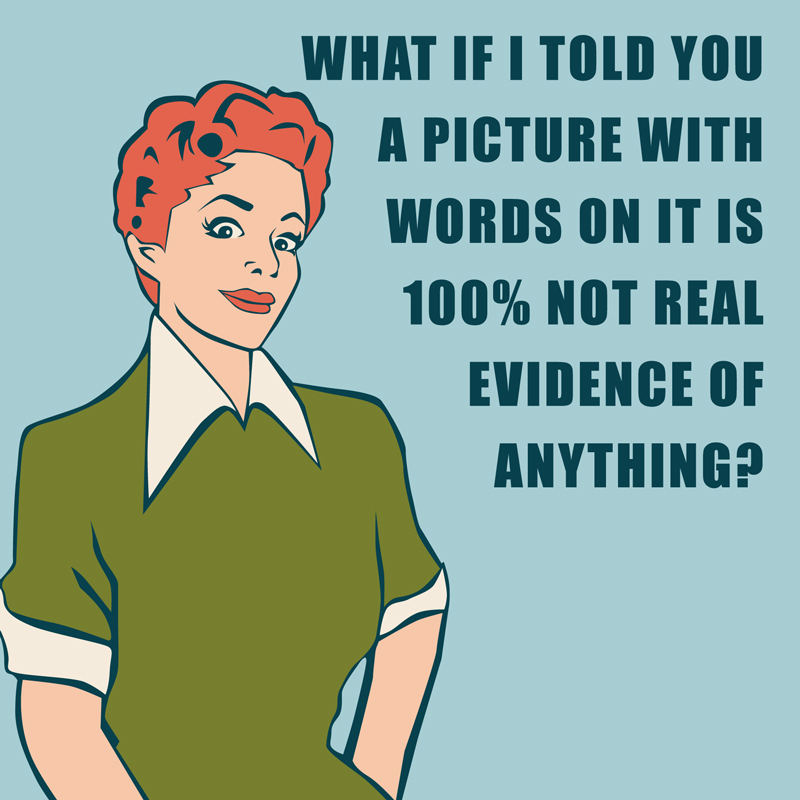Everything you put on the internet is permanent even if it is later deleted. Your grandchildren and great grandchildren will see everything you ever did online and it will be your legacy. I think people forget how permanent the internet really is and how inappropriate some of the things we post truly are.
And just so we are clear, I have personally shared all of these and even created some of these. But it is time to think about what we are permanently putting out into the world and the ripple effect consequences. Here are five viral posts you should think twice about before sharing:
1. Opinion Posts Featuring Small Children
Think about it. You have no idea if there was parental consent to share them. Can you imagine having your child passed around by total strangers as commentary on their weird opinions your family doesn’t agree with?!?! That could be an absolute nightmare watching your baby go viral. These can range from political views to criticizing society. Even if their parents put them out on the internet for some reason, the minors are not an adult and don't understand the consequences of the image permanently on the internet. They could grow up always being 'the kid from that meme' and I wouldn't wish that kind of personal lifetime embarrassment on any child.
There is also a new trend of children talking like adults (AKA parroting what their parents say) and these are particularly toxic. Some are political and some aren’t, but if the kid is under 18, they are not an expert on any topic yet and the video shouldn’t be shared. By sharing these divisive videos you could actually put them at risk in their schools and elsewhere, based on regulations they have to adhere to and possible bullying.
There are so many things you shouldn't do to a young children because they are just not mature enough to understand. And passing around a photo of a child you don't know, with your own opinion on their image is one of them. It is also REALLY creepy if you think about it.
2. People in Embarrassing Positions
We have all seen images of people in embarrassing and unflattering poses who are unaware a photo is even being taken of them. Most of these images are taken and put on the internet without their consent. By 'tagging a friend' with the unflattering meme you are doing to exact same thing as a school yard bully. You are pointing at a kid who looks different and laughing at their expense. Also, if someone didn't know a photo was taking a photo of them, the meme is basically voyeuristic harassment.
You wouldn't want it done to you so don't do it to someone else. How would you like an image on the internet of you at one of your lowest moments going viral? The whole world laughing at your expense? You have basically become the paparazzi on a regular person who didn't ask for any kind of fame. And take it from me, internet hate is no joke.
There has also been a recent uptick in shaming parents. People post pictures of situations and scream bad parenting without knowing the whole story. This not only makes a bad day worse but it can ruin people’s lives and even have legal repercussions.
3. Memes with 'Facts' that Have No Evidence
Memes with facts with no links to prove their numbers are as easy to create as a snap on Snapchat. Anyone can put words on an image today. It doesn't make them true. If any facts are claimed in percentages, numbers, or dates in a meme, make sure it is linked to a credible article supporting them. And someone's blog is NOT a credible article. They only way a blog has credibility is if they back it up with evidence. (My blog is a great example. I have my resume posted, hundreds of blog posts, a press page, and links to my social media. You can see I have been doing marketing and design for many years for many big name companies and have experience with viral posts.)
4. Someone About to Tell You the TRUTH
If someone is about to tell you the 'truth' about something (typically politics, food, or a group of people) from his kitchen or the driver's seat of his car, WHY WOULD YOU SHARE IT!?!?! Ask yourself who made this? Was it made by a regular person or someone who actually had qualifications? And someone's blog is NOT a scholarly article. There is a reason why these people aren’t telling you this information from the office of their business. It is because they are just as unqualified as you and me. And if you post a video of someone who isn’t qualified to prove your unqualified opinion... It is like the blind leading the blind people.
There are also a ton of these videos that have headlines like "All Liberals..." or "All Millennials..." or "The TRUTH **insert group of people you think you are smarter than** Needs to See" and these are extremely divisive and shouldn’t be shared. And quite frankly they make you look like a giant asshat. Remember, if you share content, you are saying you stand behind every word. If you stand behind pointed hateful words from a totally unqualified stranger what does that say about you?
5. The Long Reposted Status
We have all seen these viral posts that people repost after a political event. They were supposedly written by a normal everyday person just like us. (Usually they come from accounts that look like normal people but if you do a little digging you will see the person is either crazy, needs attention, or it is a fake person with the sole purpose of creating divisive posts. I am not saying Russians... but...) These posts are really long and prewritten and usually claim that the person posting it, has a higher morality than 'other people.'
They are extremely divisive and usually blame a person who identifies with a group, with the sins of extremists from that group. They don't help anyone. They just make you a giant asshole who apparently is all talk and no real action (with nothing original to say). Before you share these make sure you aren't pointing at certain people out of your own frustration or insecurity. Once you post this you are standing behind the entire post. Not just part of it. Not just the general idea of it. You have just endorsed every word of that divisive rhetoric. Most of the time the people they are directed at to shame want the exact same thing we do, safety and happiness for our families, they just go about it in a different way.





